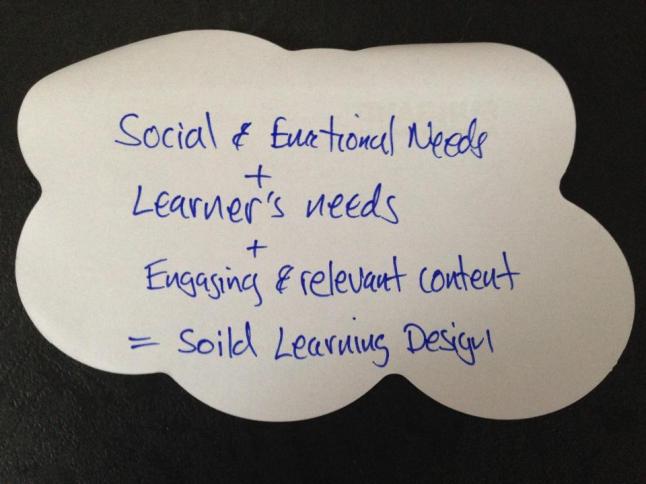There have been numerous blogs, articles, and websites that have created meaningful dialogue on the topic of the skills necessary for the 21st century learner. As part of my #tiegrad courses, I have been asked to contribute to this topic by adding my own set of skills. I designed this model to help myself make the connections between the people, the content, and skills required for learners in the 21st century.
Four skills important for the 21st Century learner that relate to my practice are social and emotional skills, and physical/natural skills, basic (core) academic skills, and higher-level thinking skills. When these skills are supported and practiced by the school, home, and the community, and combined with authentic, meaningful and real-world practice we are preparing our learners to make positive contributions to society.
Skills in order of importance:
1. Social and Emotional Skills
“Research conducted during the past few decades indicates that social and emotional learning programming for elementary- and middle-school students is a very promising approach to reducing problem behaviors, promoting positive adjustment, and enhancing academic performance.” – John Payton, CASEL
I have written about the importance of social and emotional skills in learning before. As we become more connected in a technology sense, we become less connected in a face-to-face sort of way. The skills required to be successful in the real world involve collaborating and problem solving with others. Humans are far more productive and effective when they work together in groups consisting of people with different strengths and not independently. The 2008 CASEL report, The Positive Impact of Social and Emotional Learning for Kindergarten to Eighth-grade Students emphasizes the importance of these life skills and their direct correlation to academic success.
2. Basic Core Academic Skills
It is critical to develop basic core academic skills in learners, as they are lay the foundation for the development of higher order thinking skills later in life. How is it possible to develop a cell phone battery that lasts an entire day without knowing how electricity flows in a circuit? I feel there is a shift in education towards engaging our learners in higher order thinking skills such as critical thinking, synthesizing, evaluating, and producing at the cost of developing basic academic skills. Higher-level thinking skills are important but there needs to be a balance between these skills and the development of foundational skills. In my experience those learners who know their times tables are far more effective at completing multiplication task when compared to those who. They are stronger at working on problem solving, and generally enjoy mathematics more than those who struggles with basic computation. It can be compared to children reading for information. Fluent readers are far more effective at reading for information when compared to those learners who need to decode, break apart, and sound out the majority of the words they read. Learners need opportunities to repeat tasks over and over to achieve mastery. If they are constantly challenged with new material they may suffer from academic burnout and shut down – effectively stagnating their learning process. In Kelly Tenkely’s article, Why Drill and Skill are Necessary in Education and later comments she defends the need for drill and skill in education. By no means does she suggest that her entire curriculum should be founded on these skills, rather she advocates for balance. “These activities give students an opportunity to practice a skill and become familiar with it before creating with it. Drill and skill games and activities give students room to find patterns and build understanding.”
3. Physical/Natural Skills
“We have such a brief opportunity to pass on to our children our love for this Earth, and to tell our stories. These are the moments when the world is made whole.”
Richard Louv
A 2013 Maclean’s article titled, Early education: this is not a field trip reports on a pilot kindergarten program designed to exposed young children to the wonders of nature. With “90 per cent of Canadian children are gaming and six out of 10 households have a gaming console” there exists evidence that children are not spending the same amount of time playing outdoors as they once did. Children who do not engage in active play outdoors don’t learn to socialize, share, and problem solve in the same way children who are in touch with nature do. In my experience, students spend entire weekends playing video games, and rather venture outside to play. A healthy balance between indoor and outdoor play has been lost.
4. Higher-Level Thinking Skills
We need to develop, in our learners, the ability to use the technology that exists at their fingertips today, the technology that will be developed in the future. I genuinely believe we need to be raising a generation of socially conscious learners who, through the use of technology, can make the world a safer and healthier place for generations to come. By facilitating the learning of higher-order thinking skills such as problem solving, critical thinking skills, a sense of inquiry, comparing and identifying ideas, and using old concepts to create new ideas, we can encourage our learners to innovative. The basis of robust learning design focuses more on what learners can do with knowledge and not how much knowledge they can retain.
In summary, there are many skills that are useful for today’s learner. You may or may not agree with the importance of these skills I suggested or how they relate to today’s learner, but in my experience and based on the 9-11 year olds I work with, these are important skills. When learners have a strong support network, when they engage with content that is relevant and meaningful, when they are allowed to follow their own paths of inquiry, and have their physical and emotional needs met, they take a step closer to becoming lifelong learners.
What skills do you think are necessary for your learners now and in the future?

